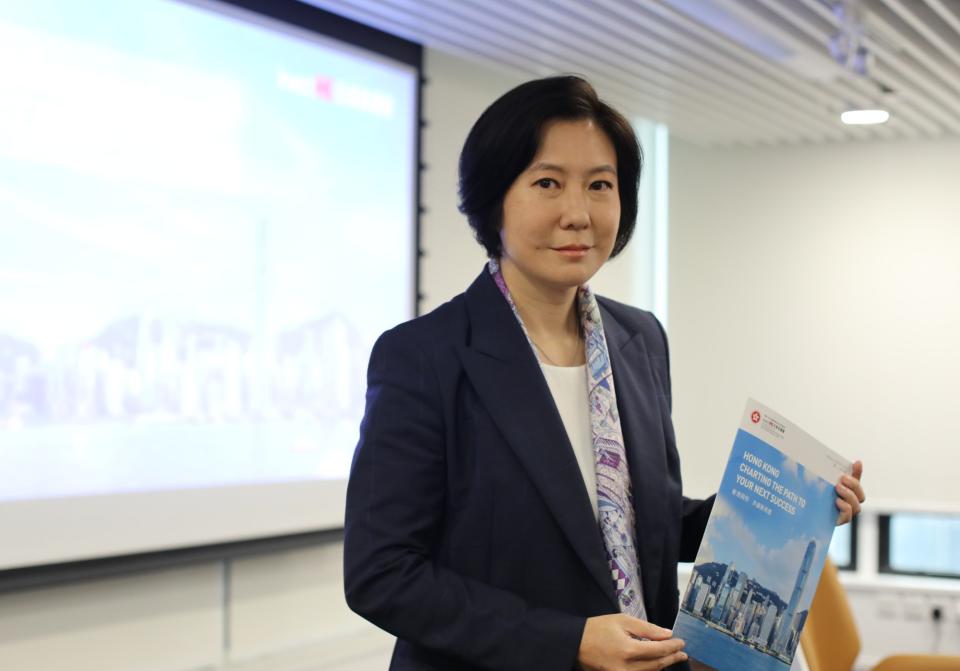Hong Kong draws US$1.3 billion from investors with city's cash-for-residency olive branch
Hong Kong has attracted more than HK$10 billion (US$1.3 billion) under the four-month-old cash-for-residency scheme, in a major boost for the city's ambitions to become a family office hub with a deep wealth management market, officials said.
The revamped Capital Investment Entrant Scheme (CIES), more commonly known as the investment migration scheme, has received 346 applications as of last Friday, according to Alpha Lau Hai-suen, director general of InvestHK, the government agency set up to promote the city as an international financial centre.
She told lawmakers on Monday that 214 applications had been cleared, while 117 had won in-principle approval with the grant of temporary visas, which allowed the applicants to stay in the city for up to 180 days for making the required investments.
Do you have questions about the biggest topics and trends from around the world? Get the answers with SCMP Knowledge, our new platform of curated content with explainers, FAQs, analyses and infographics brought to you by our award-winning team.
Lau said four applicants had already received residency visas after making investments of HK$30 million each. If all 346 were to get approvals, they would bring in at least HK$10.38 billion of investments into the city. "So far, no applications have been rejected," she said.

Alpha Lau Hai-suen, director-general of InvestHK, meets the press in Admiralty. Photo: Xiaomei Chen alt=Alpha Lau Hai-suen, director-general of InvestHK, meets the press in Admiralty. Photo: Xiaomei Chen>
The cash-for-residency scheme, launched on March 1, allows wealthy individuals and their families to get fast track residency when they make investments of at least HK$30 million (US$3.85 million) in Hong Kong stocks, bonds, deposits, funds, investment-linked insurance policies and non-residential properties.
"The CIES targets to bring the ultra-high-net-worth individuals to Hong Kong, which refers to those with a net worth of at least US$30 million," Lau said at the monthly financial affairs panel meeting of the Legislative Council adding that their investments of at least HK$30 million each would benefit the local economy and capital markets.
"The large number of applications is a great response. We expect more applications as more than 3,700 enquiries were made about the scheme," according to Lau. "While we will push bankers, lawyers and accountants to bring in more applicants to Hong Kong."
About 70 per cent of the applicants are from mainland Chinese holding passports from Western African country Guinea-Bissau and South Pacific Ocean nation Vanuatu, Lau said while adding that the other applications were from citizens of 25 other countries, including Canada, Australia, the UK and the US.
Secretary for Financial Services and the Treasury Christopher Hui Ching-yu said the popularity of the CIES is set to further boost the city's role as a hub for family offices.
"We found that many CIES applicants have expressed interest in setting up family offices in Hong Kong. The government will follow up with them, while we will also seek ways to align the CIES and the family offices development," Hui said in the same panel.
Victor Li Tzar-kuoi, chairman of CK Asset, said his family "intends to institutionalise the establishment of a family office in Hong Kong, with long-time colleagues and family members [as] managers."
The family has already made a lot of investments, the elder son of the Li Ka-shing, Hong Kong's richest man, said in a statement to a media query.
Hong Kong had more than 2,700 single-family offices - firms established to pursue investment, philanthropy and succession planning - at the end of last year, according to a study published by Deloitte in March. Each manages between US$10 million and US$100 million of assets.
The government introduced tax incentives for family offices in May last year and established the Hong Kong Academy for Wealth Legacy in November to nurture talent for family offices. These schemes, alongside the CIES introduced in March, aimed at achieving Chief Executive John Lee Ka-chiu's goal of having at least 200 large family offices set up in the city, which he announced in his first policy address in October 2022.
Hui said InvestHK has assisted 89 family offices in setting up Hong Kong operations over the past two years, while another 130 are planning to do so. There were also 750 enquiries about setting up family office.
"The development of CIES and the family office market will further strengthen the wealth management industry in Hong Kong," Hui said while adding that the city had more than HK$31 trillion (US$4 trillion) of assets under management at the end of last year, an increase of 2.1 per cent from a year ago.
"This has led many private bank and wealth management companies to expand their operations in Hong Kong," Hui said.
Some lawmakers had urged the government to relax the investment rules for CIES, Hui said. The government will consider the views of the lawmakers, he said, but emphasised there was no intention to expand the scheme to cover residential properties.
Hong Kong had originally introduced the CIES after the Sars (severe acute respiratory syndrome) outbreak in 2003, but it was terminated in 2015 because of speculation in the property market.
"The new CIES has excluded residential properties because this is an item that would affect a lot of end users and the livelihood of the people in Hong Kong," Hui said.
This article originally appeared in the South China Morning Post (SCMP), the most authoritative voice reporting on China and Asia for more than a century. For more SCMP stories, please explore the SCMP app or visit the SCMP's Facebook and Twitter pages. Copyright © 2024 South China Morning Post Publishers Ltd. All rights reserved.
Copyright (c) 2024. South China Morning Post Publishers Ltd. All rights reserved.

 Yahoo Finance
Yahoo Finance 